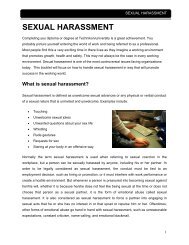Conference Booklet 11 Nov - Nina - CPUT ACTIVE Web - Cape ...
Conference Booklet 11 Nov - Nina - CPUT ACTIVE Web - Cape ...
Conference Booklet 11 Nov - Nina - CPUT ACTIVE Web - Cape ...
You also want an ePaper? Increase the reach of your titles
YUMPU automatically turns print PDFs into web optimized ePapers that Google loves.
50 Paper Abstracts—In Alphabetical Order of Presenters<br />
CONCEPTUALISING THE SELECTION PROCESS OF BUSINESS<br />
INCUBATORS: A PROPOSED FRAMEWORK<br />
ABSTRACT<br />
GOOSAIN SOLOMON, PER LIND*<br />
Stellenbosch University, Stellenbosch, South Africa<br />
*Gotland University, Visby, Sweden<br />
The business incubation process consists of sub processes namely<br />
selection, business support, mediation and graduation. The literature<br />
proposes that selection of incubatees has potential to influence<br />
the success rate of the incubation process.<br />
This paper proposes a conceptual framework to improve the selection<br />
process of the incubation process. Incubator type, incubator<br />
objectives, stage in life-cycle of incubator as well as critical success<br />
factors have been identified as key factors and are proposed for<br />
consideration in the selection process. It is argued that the selection<br />
process informs the incubation process, distribution of roles between<br />
incubatee and incubator and acquisition and development of<br />
identified resource gaps.<br />
INTERNATIONAL VIRTUAL TEAM WORK AS A MEANS OF IN-<br />
FORMING THE INTEGRATED NATURE OF BUSINESS.<br />
DM HEPBURN 1 , BK TEMPLE 1 , M ADYA 2 AND W SIMCOE 3<br />
1 Glasgow Caledonian University, Glasgow, UK:<br />
2 Marquette University, Milwaukee, USA:<br />
3 Metropolia University, Helsinki, Finland<br />
ABSTRACT<br />
Success and effectiveness in Virtual teamworking is influenced by<br />
four interrelated dimensions [1]: virtual presence, social responsiveness,<br />
shared goals, and identity. We report on differential manifestation<br />
of these elements in communication and success of interdisciplinary<br />
teams.<br />
In 2008/9, some UK engineering students worked with Finnish business<br />
students studying Entrepreneurship, others worked with USA<br />
business students studying project management, to create a feasibility<br />
study for a new product. Team members would gain experience<br />
within their own field and knowledge of that of their teammates.<br />
Video conferencing facilitated virtual team meetings.<br />
Virtual teams developed a strong and positive virtual presence<br />
where teams recognized the value of videoconferencing in communications.<br />
Videoconferencing also enabled social responsiveness.<br />
Differences emerged with regard to shared goals and identity<br />
within the international teams, possible reasons will be discussed.<br />
Differences emerged between visiting Asian/African and home students<br />
in UK, e.g. engagement with both videoconferencing and<br />
feasibility case. Individuals from collectivist nations may have different<br />
group working skills and be less prepared for communicating in<br />
project situations [2]. Our findings suggest numerous implications<br />
for teaching and engagement of virtual teams.





